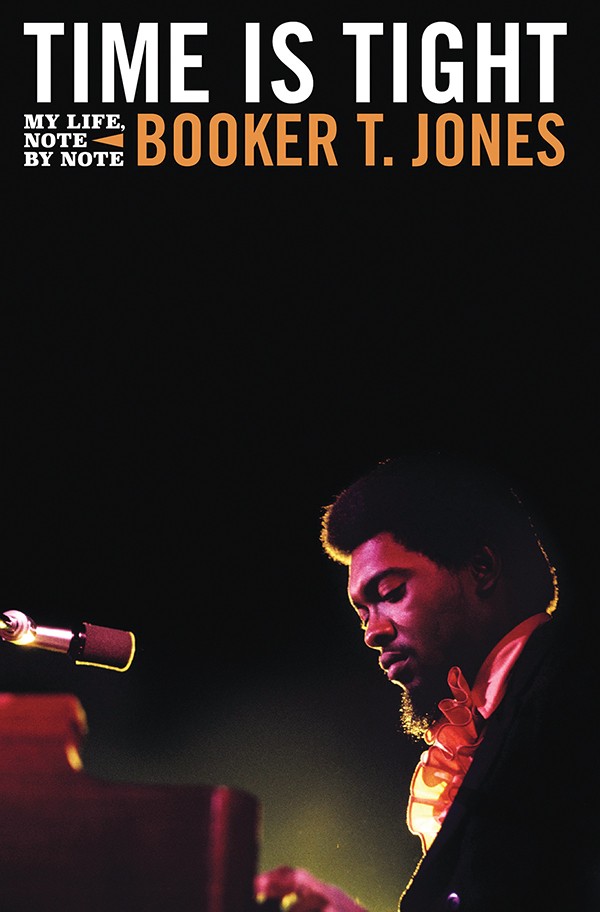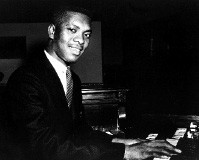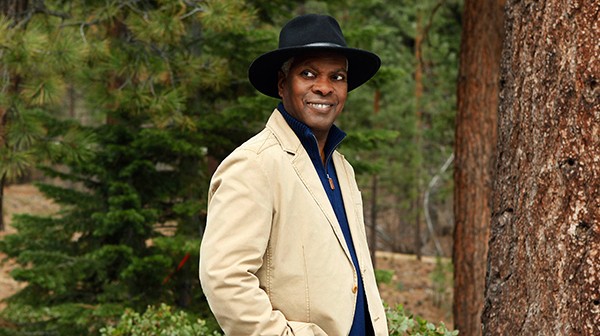Most Memphians associate Booker T. Jones with the M.G.’s, the house band for the glory years of Stax Records and instrumental hitmakers in their own right. But Jones’ several decades’ worth of hits as a producer and distinguished sideman after moving to California should not be lost in the shuffled beats of McLemore Avenue.
This quickly becomes apparent when reading his vivid and thoughtful autobiography, Time Is Tight: My Life Note by Note (Little, Brown, 2019), which opens not on the tracking room floor of a studio, but with the words “Acapulco Gold,” the smoke of a joint wafting around him during his first brush with an earthquake in Malibu. From there, Jones presents vignettes from all chapters of his life, skipping like a stone over the river of his years. And, of course, many ripples extend outward from Memphis.
 Piper Ferguson
Piper Ferguson
Booker T. Jones
Still living in California, Jones spoke with me about how he came to write the book, his approach to music, and how he still treasures lessons he learned in the Bluff City long ago.
Memphis Flyer: Was your new book quite a long time in the making?
Booker T. Jones: Yeah, it was much longer than I thought it would be. I didn’t start out to write a book. Ten or 12 years ago, I was just writing some essays about my life. It was almost like practicing songwriting. I was just practicing writing. And my wife said, “Why don’t you make that into a book?”
I had a number of accomplished authors offer to write or help me write it. But I read some autobiographies of some very close friends, and the problem was, all the events were accurate, and the facts were accurate, but the voice was just not their voice. So that’s why I decided I’d just like to, right or wrong, do it in my own voice.
Your voice certainly comes through in the very personal passages, such as when a teacher caught you cheating on a test and took you straight to your father’s classroom in the same school.
Yes, and in the book, there’s a photo of him in his white shirt and tie, standing by his blackboard. And that’s right where the woman marched me, right up there in the front of the room, right next to him. That’s where I had to stand in front of everybody.
Reading the book, one thing that strikes me is the importance of families to the Memphis scene. The Steinbergs, the Newborns, the Jacksons, and your own.

I’m glad you picked that up. It’s amazing, how there’re a lot of indications of that. It’s in the language. The use of words. And a lot of it is in the nice sense of community, of well-meaning activities for young people in Memphis that I took advantage of.
I’m curious about your approach to minimalism, your restraint, through so much of the Stax material. You never really tried to play like, say, a Jimmy Smith.
It was a convergence of attitudes, fortunately, for me, when I got to Stax. It was always underneath the surface, but it came out into the open with Al Jackson Jr., and Duck [Dunn] and Steve [Cropper] in particular, and also Jim Stewart. We actually talked about it. We didn’t use the term minimalism, but it was almost like, “Keep it simple, don’t play too much.” It’s almost like there’s a spiritual revelation or accomplishment in simplicity.
We’re really getting into it here, Alex, with this whole idea behind minimalism and music. I mentioned in the book that when I was playing the song “Time is Tight,” I hold that note, that one G, for so long in the melody, but that also gives me a chance to kind of emote and be emotional while that note is playing, you know, underneath it. And it’s such a simple melody.
You work the Leslie [tremolo speaker] beautifully on that simple melody as well.
Thank you. I’m really glad to hear you say that. I wanted this to be a book for musicians, to relate to and get into some of the concepts, and do exactly what you’re doing with it.
Yes, you even have some musical charts in the back.
The music that is printed in the book represents ideas of mine that go with the chapters, that I’m trying to emulate some of the feelings of those chapters. It’s not really music that’s been recorded. It’s just three or four bars of sentiment about that particular chapter, in music.
 Courtesy of Stax Museum
Courtesy of Stax Museum
Booker T. Jones
Speaking of the power of simplicity, I was fascinated to read that you were inspired by Bach when you composed “Green Onions.”
It’s just those three chords, the one, the minor three and the four, and the inversion on the right hand, where the little pinky finger starts on the tonic and goes down to the fifth and then the third. And it’s the repetition of it. I feel like the voicing I’m using is Bach’s piano voicing. And that’s what I was studying at the time. I was trying to figure out Bach’s reasoning for moving the notes the way he did when he wrote all his contrapuntal fugues and so forth. And repeating all that over and over in a kind of jazzy, bluesy, groove, there’s just something about the imposing that on blues. I don’t know how to say it. There’s something about that. It’s still one of my favorite records. It still kind of hypnotizes me.
You might be interested to know that there’s a crack band of Memphis players, the MD’s, who play only Booker T. & the MGs music. And they’ve just launched a project based on imagining “what if the MG’s interpreted the Beatles’ Revolver just as they did Abbey Road?” In fact, the band learned the entire MG’s album, McLemore Avenue, before they did it. It’s really something. They call the new album Revolve-Her.
I’d love to hear that. Revolve-Her! That’s reminiscent of Hip Hug-Her! Well, they are really into it.. Cool. That’s so great. Send me whatever information you can. If they worked on McLemore Avenue, that would give them a jumping off point for how to do that, how to have a better understanding of doing Beatles music in the spirit of Booker T. and the MGs.
Reading the book, I was impressed at how deeply you studied music theory even at Booker T. Washington High School, and then later at the University of Indiana at Bloomington. Was there a conflict between your love of minimalism and the formal studies of complex music theory and arranging you were doing at BTW and Bloomington?
It was impossible for it to be a conflict for me, because so early on I had this curiosity about the different instruments and their textures. So I was compelled to know what key the French horn is in. What an F-clef was. I had the music in my head, and that was what I wanted to write down. So I never did get the chance to choose to be a by-ear musician. I knew a lot of people who were, and I could have been a by-ear musician.
Although actually, I was a by-ear musician. And I think I fooled a lot of people, because I could hear music and I could play it just ‘cos I heard it. A lot of by-ear musicians do that; they can play symphonies or whatever, without actually knowing what the notes are. But the minute you get that desire to reproduce for a group like the Memphis Symphony…
Anyway, I still do by-ear sessions. I just did one a couple weeks ago. I don’t always write it down. I think I function both ways, now that you mention it. I never really thought about this before. A lot of players, you can just hum it to them, and you say, “Put a harmony to this,” and they know what you mean. And in some ways it’s faster.
You know, we did head arrangements at Stax. But those guys also read music. So sometimes I wrote stuff down for them, but most of the time, we worked with artists who just hummed the lines to us, or just did our own head arrangements.
Otis would dictate horn parts…
Oh yeah, he would jump around singing and shouting and humming.
Did he suggest organ parts that way?
No, usually horns. He had song ideas, and definite ideas about horns. He left the keys pretty much open to me and Isaac.
I was shocked to read that that’s Isaac Hayes playing organ on “Boot-Leg.”
I was shocked too! I drove 400 miles from Bloomington to Memphis, and Cropper says, “Hey Book, I want you to hear something.” He played “Boot-Leg” and I was so confused. I thought, well maybe that’s a Mar-Keys record, when I heard the Hammond organ. But I don’t tune the Hammond that way; I have different drawbar settings. Yeah.
Well, you were gracious about it.
Thank you. It’s great, it’s absolutely a great track. Great bassline. I love it.
Were there any other MGs tracks that didn’t include Booker T?
That was the only one, while it was Booker T and the MGs. It was the MG’s without me, I think Carson Whitsett played with Al and Duck and Steve after I left Memphis. But “Boot-Leg” was the only one. It was a great one though.

Booker T. Jones
People don’t talk about your piano playing much, but it seems that’s as much your instrument as the organ.
Yeah, I am first and foremost a pianist. I do Hanon scales maybe twice a week or more. That’s my go-to when I want to whip myself into shape. The first time that music evoked an emotion in me was hearing my mother play Debussy, Liszt, and Chopin on the piano. Very emotional stuff.
You write in the book that scoring the movie Uptight! was fulfilling a long held dream of yours, to compose soundtracks. But I gather you didn’t do many soundtracks after that.
No, that’s true. I had dreamt of going to Hollywood and scoring movies at some point. I think that’s one of the reasons I went to Indiana. Of course, when I got to Hollywood there were no African-American musicians scoring music. Henry Mancini was trying to bring people like Quincy Jones in and Quincy was really the only one that kind of broke through that. Of course he came right to see me when he heard I was doing the score and sent aides over to my sister’s house, to help me.
So there was a lack of opportunity for black directors and composers as well. I was really disappointed in Hollywood in that area. Uptight! was a Jules Dassin film. Jules was very talented. But because of his political leanings, he was not a Hollywood favorite. I think he was pretty lucky to get that deal with Paramount. But he actually got kicked out of Hollywood because he was married to Melina Mercouri, and she went on the Johnny Carson show and told the nation that Greece was about to be overrun by a junta. So that happened, and the next morning we were up and out of Hollywood, just like that. Just gone, out of Hollywood. So we went to Paris.
But yeah, scoring films was an ambition of mine. I guess I used to go to the theater on Mississippi Boulevard and that was a fantasy of mine.
It seems things have changed now enough to where you could have more opportunities now.
The industry has kind of moved on. It’s completely changed. But it’s a hard job to score a film. It’s a lot of work. I know quality musicians that have left the field because it was so crazy. André Previn was the first one. He was making millions of dollars composing music and he quit because it was just too much. The deadlines. You work with a director, and music has just such a big role in pictures, and it’s just so arbitrary, I’ll say that. You have to be so disciplined as a composer for film, because it’s all about the story. It’s all about what’s happening on screen.
You sometimes work with students at the Stax Music Academy on your return visits.
Yeah, so much talent there. I used Evvie McKinney on my recording of ‘”‘Cause I Love You.” She sounds so good on that song. She’s a Stax graduate, and I’m sure there’s gonna be collaborations with others from Stax in the future.
Time Is Tight: The Life and Times of Booker T. Jones
I just started a record company, that’s why I’m saying this. It’s called Edith Street Records. ‘”‘Cause I Love You” is the first release on Edith Street Records and it’s a companion to Note by Note album, which is a companion to the Time is Tight book.
What’s the rest of the new album like?

It’s a musical reproduction of my life. ‘”‘Cause I Love You” was the first song I ever played on at Stax. “Time is Tight” and some of those songs I recorded in Memphis are on there. And it kind of correlates with the chapters of the book. Each chapter has a musical song as its title.
You were relatively young when you moved out west. What does Memphis mean to you today?
Sometimes, when I’m preaching about how great it is to have come from Memphis and how lucky I was to have been born there, someone might say, “Well, I come from Cincinnati, and it’s great to be from there too!” But I do feel that Memphis is special, and I’m thankful that I grew up there and got my musical start there. And Time Is Tight is sort of a tribute to that, I think.
An Evening with Booker T. Jones, with Daily Memphian reporter Jared Boyd, takes place at the Stax Museum of American Soul Music, 926 McLemore Ave., Friday, November 1st, at 7 p.m.; doors open at 6 p.m. A screening of an Aretha Franklin documentary takes place at 4:30. Free.